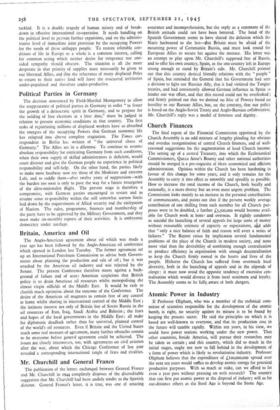Britain, America and Oil
The Anglo-American agreement about oil which was made a year ago has been followed by the Anglo-American oil conference which opened in London last Tuesday. The former agreement set up an International Petroleum Commission to advise both Govern- ments about planning the production and sale of oil ; but it was attacked by the American oil industry and was rejected by the Senate. The present Conference therefore meets against a back- ground of failure and of acute American suspicions that British policy is to drain American oil resources whilst monopolising the almost virgin oilfields of the Middle East. It would be rash to cherish much optimism about the outcome of the Conference. The desire of the American oil magnates to remain free of any control at home whilst sharing in international control of the Middle East ; the intimate interest not only of Britain but of Soviet Russia in the oil resources of Iran, Iraq, Saudi Arabia and Bahrein ; the fears and hopes of the local governments in the Middle East: all make for diplomatic deadlock rather than for universal, planned control of the world's oil resources. Even if Britain and the United States reach some real measure of agreement, many further obstacles remain to be overcome before general agreement could be achieved. The issues are closely interwoven, too, with agreements on civil aviation after the war, about which the Chicago Conference of last year revealed a corresponding international tangle of fears and rivalries.






















 Previous page
Previous page